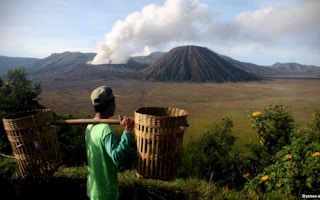Indonesia needed to remove a host of legal barriers if it wanted to boost development in alternative energy sources such as geothermal, solar and hydropower plants, a senior government official has said.
Rida Mulyana, the director general of new and renewable energy at the Energy and Mineral Resources Ministry said on Monday that the Forestry Law should, for example, be revised in order to be able to accelerate the development of geothermal power plants.
“Without a legal breakthrough, much of the geothermal reserves cannot be developed because they contravene the Forestry Law,” he told reporters on the sidelines of the Asia-Pacific Economic Cooperation (APEC) conference on clean and renewable energy.
The existing Forestry Law prohibits open-pit mining in protected forests, but Rida said that geothermal exploration activities should be exempted from the law because unlike mining activities, geothermal drilling would not damage the environment.
Indonesia has been encouraged to turn to renewable energy sources. To support its fast-growing economy, Indonesia remains highly dependent on fossil fuels such as oil and coal, which cause serious environmental damage.
According to the Energy and Mineral Resources Ministry’s data, approximately 70 percent of total electricity in the country is generated from oil and coal-fired power plants, as compared to 5 percent generated from renewable energy sources.
Observers have said that the potential for renewable energy advancement in Indonesia was massive.
Indonesia is blessed with immense amounts of energy from the sun, with a large fraction of the archipelago located on the equator. It also possesses 40 percent of the world’s geothermal reserves, with total energy potential in various spots in the country estimated to be able to provide around 29,000 megawatts (MW).
Indonesian Renewable Energy Society (IRES) chairman Rachmat Gobel said the country needed an integrated strategy to promote the use of renewable energy, the sources of which were abundant locally and on a massive scale.
He said the government planned to revise the law to remove the legal uncertainty.
“If we can endorse that, our industry will improve and we could also potentially become one of the biggest providers of renewable energy sources in the world,” he said.
Rachmat added that the key measure to spur investment in renewable energy development would be to ensure legal certainty, which currently was one of the major impediments to investors wanting to initiate projects in the sector.
Apart from that, Rachmat pointed out that certain fiscal incentives, including government subsidies, would be effective aids in helping to expand the utilization of alternative energy sources on a wider scale and spur investment in ecofriendly projects.
The government already offers tax holidays for investment projects to generate power from renewable energy sources, such as geothermal power plants, but business players agree that they are still insufficient to encourage widespread private engagement in the sector.
Observers have said that the development of renewable energy was also imperative for Indonesia’s economic stability, as the country’s addiction to coal and oil had led to a significant increase in oil imports, enlarging its current account deficit.
The operation of all the coal and oil power plants throughout the country used at least 6 million kiloliters (kl) of subsidized fuel annually, according to Nasri Sebayang, state-run electricity firm PT PLN’s director of construction and renewable energy.
Indonesia needs legal breakthrough to boost renewable energy

Terpopuler
-
![eFishery's co-founders Gibran Huzaifah and Chrisna Aditya]()
Berita / Pangan & Agrikultur
Temasek-backed agritech firm eFishery suspends co-founders over alleged embezzlement
Just months after talking about going public following a successful US$200 million funding round, Southeast Asia’s first agritech … -
![Eye_of_storm_NASA_Typhoon_Maysak]()
Berita / Karbon & Iklim
Record-breaking Philippines typhoon season was ‘supercharged’ by climate change
This year’s record-breaking typhoon season in the Philippines – which saw six consecutive storm systems hit the country … -
![Plastic_Pollution_Mekong_Woman_Fisherfolk]()
Berita / Manajemen Sampah
The struggle against plastic choking the Mekong
Plastic is now ubiquitous in the Mekong, Asia’s Mother of Rivers, and experts and local people are struggling … -
![Climate villains 2024_Collage]()
Berita / Karbon & Iklim
‘Climate villains’ that made headlines in 2024
Exploitation in the mining sector gave rise to the term "blood nickel", while ad agencies were in the … -
![Democracy_Pakistan_Freedom]()
Berita / Kebijakan & Keuangan
‘Creeping coup’: In Pakistan, lack of internet access is costing livelihoods
Internet outages and slow speeds lead to economic loss, but campaigners say the government is trying to muffle … -
![Rice paddy in China]()
Berita / Karbon & Iklim
‘Phantom’ rice projects expose voluntary carbon market failings
Amid accusations of fraud, lax auditors and problematic offset certifiers, is the carbon credit market still credible?









